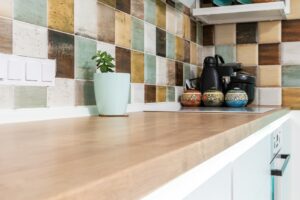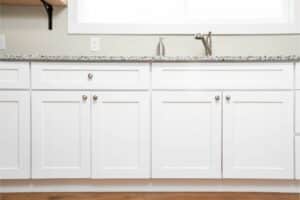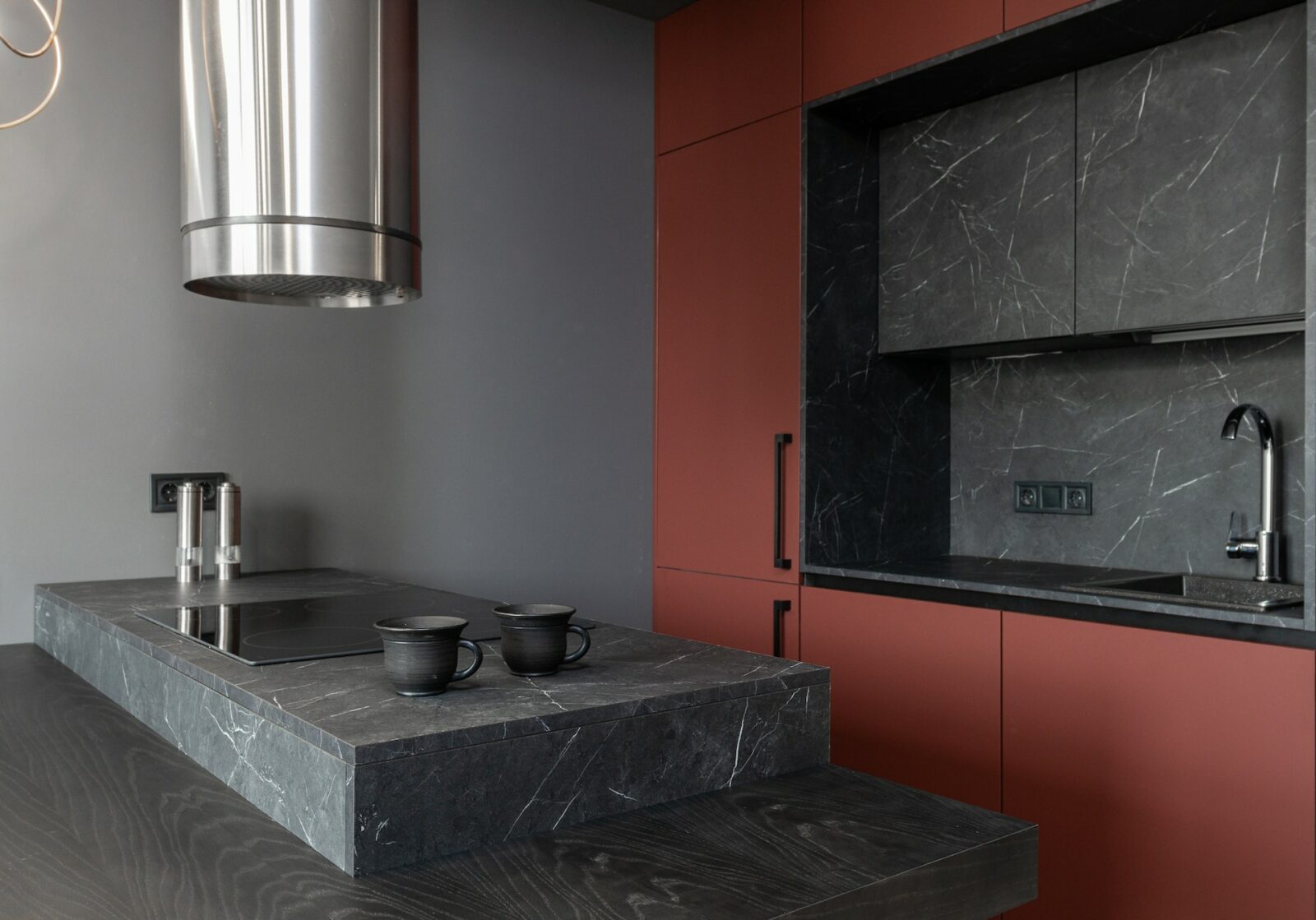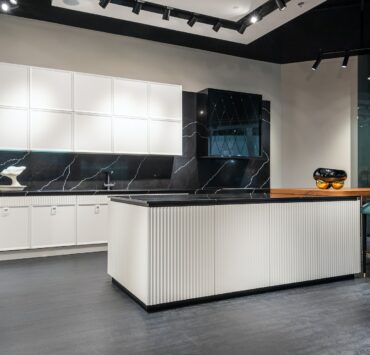Oven cleaners are a popular household cleaning product, but their use can have unintended consequences when it comes to kitchen countertops. In this blog, we answer what is the effect of oven cleaner on kitchen countertops and provide tips on how to safely and effectively clean them.
What Do Oven Cleaners Contain?
Oven cleaners typically contain a mix of chemicals such as lye, sodium hydroxide, and potassium hydroxide, among others. These chemicals are designed to dissolve and remove tough grease and grime from ovens, but they can also have an adverse effect on certain countertop materials.
What is the Effect of Oven Cleaner on Kitchen Countertops?
The effect of oven cleaner on kitchen countertops depends on the material of the countertop. Here’s a breakdown based on the different types and materials of kitchen countertops.
Tile Countertops
Oven cleaner can damage the grout between tiles and dull the finish of the tile itself.
What You Must Use
For tile countertops, you can use a solution of warm water and mild dish soap, or a non-abrasive all-purpose cleaner. Avoid acidic cleaners like vinegar or lemon juice, as they can damage the grout between tiles. You can use a soft-bristled brush to scrub away any stains or grime, and a sponge or cloth
Stone Countertops
Oven cleaner can etch and discolor natural stone countertops such as marble and granite, leaving them permanently damaged.
What You Must Use
For natural stone countertops like granite or marble, you should use a pH-neutral cleaner specifically formulated for stone surfaces. Avoid acidic or abrasive cleaners, as they can scratch or etch the surface of the stone. You can use a soft cloth or sponge to apply the cleaner, and then rinse with water and dry with a clean towel. You may also want to seal the countertop periodically to protect it from stains or damage.
Formica Countertops
Oven cleaner can dissolve the surface of Formica countertops, leaving them pitted and discolored.
What You Must Use
Formica countertops can be cleaned with a mild dish soap and warm water, or a non-abrasive all-purpose cleaner. Avoid using abrasive sponges or scrub brushes, as they can scratch the surface of the countertop. You can use a soft cloth or sponge to apply the cleaner, and then rinse with water and dry with a clean towel.
Wood Countertops
Oven cleaner can strip the finish off of wood countertops and dry out the wood, causing it to crack and split.
What You Must Use
For wood or butcher block countertops, you should avoid using harsh cleaners or abrasive sponges, as they can damage the wood. Instead, you can use a solution of warm water and mild dish soap, or a specialized wood cleaner. Apply the cleaner with a soft cloth or sponge, and then rinse with water and dry with a clean towel. You can also periodically oil the wood to protect it and maintain its appearance.
Quartz Countertops
Oven cleaner can cause discoloration or damage to the resin used in quartz countertops, leaving them looking dull or stained.
What You Must Use
Quartz countertops can be cleaned with a non-abrasive all-purpose cleaner, or a solution of warm water and mild dish soap. Avoid using abrasive sponges or scrub brushes, as they can scratch the surface of the countertop. You can use a soft cloth or sponge to apply the cleaner, and then rinse with water and dry with a clean towel.
Stainless Steel Countertops
Oven cleaner can corrode the surface of stainless steel countertops, leaving them pitted and discolored.
What You Must Use
For stainless steel countertops, you can use a solution of warm water and mild dish soap, or a specialized stainless steel cleaner. Avoid using abrasive sponges or scrub brushes, as they can scratch the surface of the countertop. You can use a soft cloth or sponge to apply the cleaner, and then rinse with water and dry with a clean towel.
Laminate Countertops
Oven cleaner can dissolve the surface of laminate countertops, leaving them pitted and discolored.
What You Must Use
Laminate countertops can be cleaned with a mild dish soap and warm water, or a non-abrasive all-purpose cleaner. Avoid using abrasive sponges or scrub brushes, as they can scratch the surface of the countertop. You can use a soft cloth or sponge to apply the cleaner, and then rinse with water and dry with a clean towel.
Risks of Using Oven Cleaners on Kitchen Countertops
The risks of using oven cleaner on kitchen countertops can range from minor surface damage to permanent staining or discoloration. In addition to damaging the countertop itself, oven cleaner can also release toxic fumes that can be harmful to your health if inhaled.
Pro tips:
- To avoid damaging your kitchen countertops, always test a small, inconspicuous area before using oven cleaner or any other cleaning product on the entire surface.
- Wear gloves and protective eyewear when using oven cleaner to avoid skin and eye irritation.
- If you accidentally spill oven cleaner on your kitchen countertop, immediately wipe it up with a damp cloth and rinse the area thoroughly with water.
- Regularly cleaning and maintaining your kitchen countertops can help prevent the buildup of dirt and grime that requires harsh cleaning products like oven cleaner.
While oven cleaners can be effective for cleaning ovens, they can have a damaging effect on kitchen countertops. To keep your countertops in top condition, it is important to use the right cleaners and methods for your countertop material. By following the tips outlined in this blog, you can safely and effectively clean your kitchen countertops without causing damage.
Related posts:
 Can You Paint Tile Backsplash?
Can You Paint Tile Backsplash?
 Decor For Kitchen Shelves: How to Add Personality to Your Cooking Space
Decor For Kitchen Shelves: How to Add Personality to Your Cooking Space
 Clever Storage Solutions: Small Kitchen Cabinets and the Best Ideas
Clever Storage Solutions: Small Kitchen Cabinets and the Best Ideas
 How Tall is a Kitchen Island? And Many More Frequently Asked Questions around Islands Answered by Experts
How Tall is a Kitchen Island? And Many More Frequently Asked Questions around Islands Answered by Experts
 The Timeless Beauty of White Oak Kitchen Cabinets
The Timeless Beauty of White Oak Kitchen Cabinets



